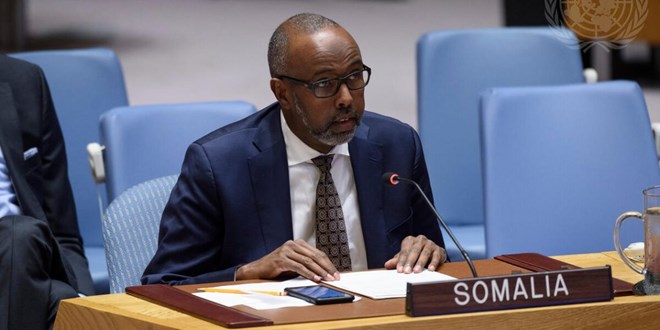
Friday May 31, 2024

FILE - Abukar Dahir Osman, Ambassador and Permanent Representative of the Federal Republic of Somalia to the United Nations, addresses the UN Security Council on October 20, 2023 / UN Mission Somalia
Mogadishu (HOL) — Somalia is set to rejoin the United Nations Security Council for the first time since 1972, aiming to advocate for African interests, address global security challenges, and enhance its diplomatic and economic standing. Along with The "A3" group comprising Algeria and Sierra Leone, Somalia will bolster African representation in the Council, focusing on conflict prevention, sustainable development, and humanitarian assistance.
Somalia's candidacy has received strong support from the African Union. Somalia was endorsed as the sole candidate for the African seat at the most recent African Union Executive Council in February 2024. Other contenders, such as Mauritius and Madagascar, withdrew in response to this endorsement.
Somalia's campaign highlights addressing the root causes of conflict, shaped by its national experiences. The country plans to leverage its memberships in the League of Arab States (LAS) and the Organization of Islamic Cooperation (OIC) to mediate regional conflicts, particularly in the Middle East and Africa. Central to Somalia's tenure will be the Women, Peace, and Security (WPS) and Youth, Peace, and Security (YPS) agendas, advocating for more robust implementation of existing frameworks and international cooperation.
Somalia's previous tenure on the Council from 1971 to 1972, marked by supporting global decolonization efforts and presiding over a high-level meeting in Africa, continues to shape its current campaign and objectives.
Somalia's membership on the UN Security Council offers strategic benefits. It seeks to enhance national security by gaining international support for counterterrorism efforts and demonstrating its readiness to manage its own security. This active role can improve Somalia's global image, attract foreign investment, and boost economic development. The platform will strengthen diplomatic relations, enabling Somalia to form strategic alliances. Additionally, Somalia will advocate for conflict prevention, emphasize the roles of women and youth in peace processes, and raise global awareness of its national issues, highlighting its capability for self-governance.
Drawing from its extensive experience in combating Al-Shabaab and other extremist groups, Somalia aims to contribute valuable insights to the Council's global counterterrorism strategies. Somalia's focus on community-based reconciliation processes and national reconciliation efforts could inform more comprehensive and context-specific counterterrorism policies within the Council.
Political polarization is expected as the Security Council welcomes new non-permanent members in 2025, including Denmark, Greece, Pakistan, Panama, and Somalia. The Security Council has been deeply divided over major global conflicts, particularly the Russia-Ukraine war and the Israel-Hamas conflict.
Russia's ongoing invasion of Ukraine continues to be a flashpoint. While Western nations, including incoming members Denmark and Greece, have condemned Russia's actions, Pakistan has taken a more neutral stance. Somalia, on the other hand, has expressed support for Ukraine's sovereignty in previous votes.
In the Middle East, the Israel-Hamas war has polarized the Council. The United States remains a staunch supporter of Israel, citing its right to self-defence. However, many other members, including Pakistan and Somalia, have criticized Israel's actions in Gaza, calling for immediate ceasefires and humanitarian interventions.
Somalia's alignment with the OIC and its positions on these conflicts may place it at odds with some permanent members, such as the United States, which strongly supports Israel. However, Somalia's stance could also serve as a bridge-builder in highly polarized debates, facilitating dialogue among differing factions.
Somalia's call for the dissolution of the United Nations Assistance Mission in Somalia (UNSOM) and the planned withdrawal of the African Union Transition Mission in Somalia (ATMIS) align with its goal of achieving greater self-reliance and sovereignty. By winding down these operations, Somalia aims to demonstrate its capability to manage its security and governance independently, bolstering its credibility and influence on the Security Council.
Somalia plans to advocate for stronger partnerships between the UN, the African Union (AU), and subregional organizations. It will support the implementation of resolution 2719, which authorizes UN funding for AU peace support operations. This could enhance the effectiveness of peacekeeping and conflict resolution efforts across Africa.
Somalia said that it also shares concerns about the misuse of digital technologies for criminal purposes and potential threats posed by artificial intelligence (AI). These issues, along with the acquisition of weapons of mass destruction (WMD) by non-state actors, are likely to be significant topics of discussion within the Council.